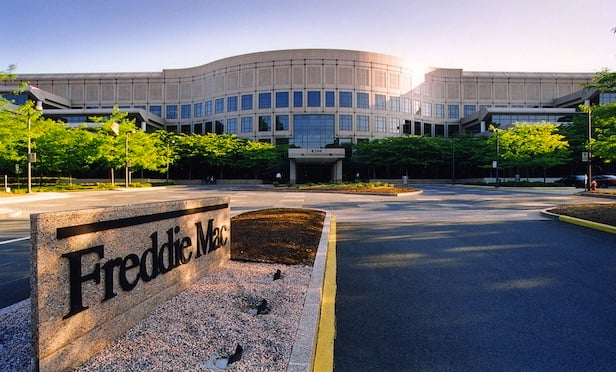MCLEAN, VA—Freddie Mac has brought to market its first multifamily real estate securitization with bonds indexed to SOFR, or the Secured Overnight Financing Rate, which is widely expected to be the substitute benchmark for Libor. It joins Fannie Mae in its efforts to move multifamily finance to a SOFR-based environment, even though that benchmark is not yet the official Libor replacement.
Freddie Mac's new offering of its Structured Pass-Through Certificates, or K Certificates, include a class of floating rate bonds indexed SOFR.
The approximately $765 million in K Certificates are expected to settle on or about December 20, 2019. They are backed by floating-rate multifamily mortgages with 10-year terms, which are currently LIBOR-based. The K Certificates includes one class of senior bonds indexed to LIBOR and another class of senior bonds indexed to SOFR.
Freddie Mac will provide a guarantee on the latter, covering any basis mismatch if the SOFR-based index exceeds the LIBOR-based index. The underlying LIBOR-based multifamily mortgages and the bonds indexed to LIBOR will eventually convert to an alternate index when LIBOR ceases to be published in 2021.
SOFR, which began publishing in 2018, is the US favorite for a Libor replacement but it is not definite. For those wrangling in the weeds of structured finance, this is a very big deal. Borrowers and even issuers, though, have been relatively sanguine about the lack of progress. "So far SOFR is the front runner," CCIM Institute chief economist KC Conway told GlobeSt.com in an earlier interview. "I think we'll all rest easier once the new Libor is identified and adopted."
Meanwhile Freddie Mac's counterpart, Fannie Mae, has issued several products tied to SOFR in 2018 and this year. According to its website, it is planning on offering several new ARM products based on SOFR for new originations, once its review of internal processes and systems is complete, and subject to FHFA's approval. Freddie Mac as well has something similar in the works and the two GSEs' plans are roughly the same.
The new index will be the 30-day average of the overnight SOFR. The GSE notes that the Federal Reserve Bank of New York is working to publish averages of SOFR beginning in the first half of 2020.
Want to continue reading?
Become a Free ALM Digital Reader.
Once you are an ALM Digital Member, you’ll receive:
- Breaking commercial real estate news and analysis, on-site and via our newsletters and custom alerts
- Educational webcasts, white papers, and ebooks from industry thought leaders
- Critical coverage of the property casualty insurance and financial advisory markets on our other ALM sites, PropertyCasualty360 and ThinkAdvisor
Already have an account? Sign In Now
*May exclude premium content© 2024 ALM Global, LLC, All Rights Reserved. Request academic re-use from www.copyright.com. All other uses, submit a request to [email protected]. For more information visit Asset & Logo Licensing.









